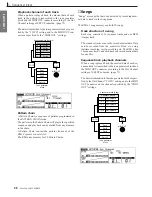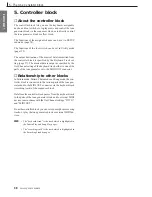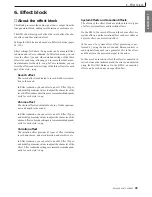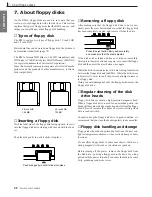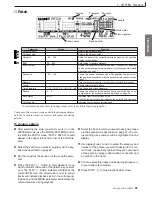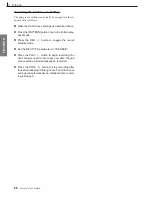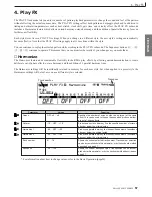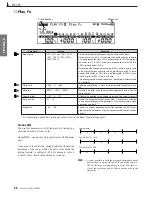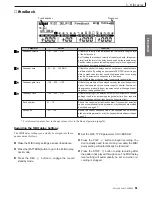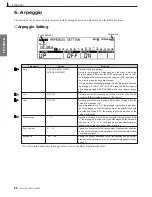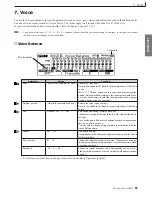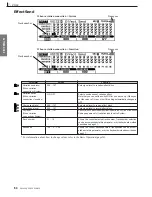
50
RM1x SEQUENCE REMIXER
PA
TTERN MODE
Recording type
The PATTERN mode offers four different phrase record-
ing types: two realtime types and two step types.
The REPLACE type records performance data in real time,
overwriting any data already present in the destination user
phrase. The new data replaces the previous data. This is
the type to use when you wish to redo a phrase that you
are not satisfied with or that you no longer need. (page 51)
The OVERDUB type - the second realtime type - records
onto the selected phrase while leaving its previous data in
place. This is the method to use when you need to create a
complex, multilayer phrase. (page 51)
The STEP type lets you compose your performance by
“writing” it down one event at a time. This is a non-realtime,
2. Recording
Parameter
Values
Function
Bank MSB / LSB
Selects the voice to be used for playing the phrase.
Refer to the separate List Book.
Program number
Selects the voice to be used for playing the phrase.
Refer to the separate List Book.
Transpose on/off
Turns transposition on or off.
Track number
01 ... 16
Shows the current selected track number. Track number selection
can be accomplished via this parameter, or by the keyboard method
described on page 27.
Transpose
-36 ... +36
Shows the current transpose value. Transposition can be accom-
plished via this parameter, or by the keyboard method described on
page 27.
Measure
Sets recording start location; or shows current recording location.
Length
001 ... 256
Indicates phrase length, in measures.
Time Signature
1/16 ... 16/16; 1/8 ... 16/8; 1/4 ... 8/4
Indicates the pattern’s time signature.
Track status
M, S
Indicates track SOLO or track MUTE.
The highlighted track number indicates the currently selected track.
Phrase name
Indicates the currently selected phrase.
You select the number at the PATCH screen. (page 47)
You can use the Phrase Name pattern job to assign the phrase an
arbitrary phrase name. (page 95)
Time signature
Track number
Track status
Transpose Measure
Length
Phrase name
step recording method - similar to the process of writing
musical notations onto music paper. This method supports
“overdubbing,” since events are not removed unless you
explicitly erase them. (page 52)
The GRID type lets you record 1-measure phrases by en-
tering notes on a 16th-note “grid” formed by the white
keys of the RM1x keyboard. The pitch, gate time, and ve-
locity of each note entered can be set via the display knobs.
(page 54)
If the style to be recorded and recording mode have al-
ready been selected in the PATTERN mode, you can en-
gage the record ready mode directly from the PATCH dis-
play. In this case the PATCH display will appear as shown
below.
* For information about how to change values, refer to the Basic Operation (page26).

